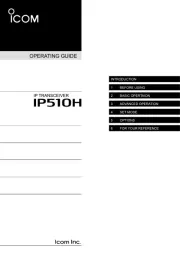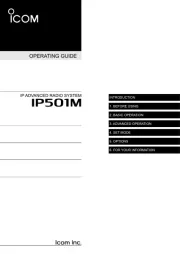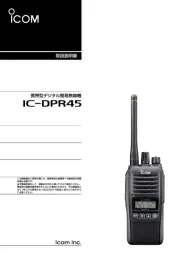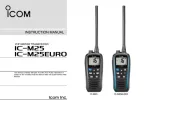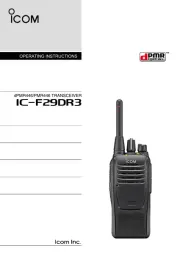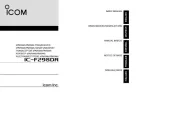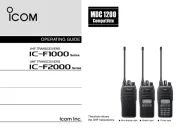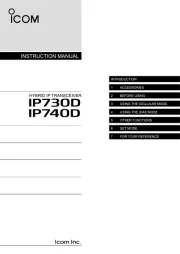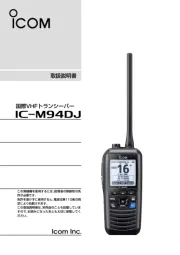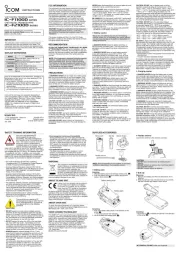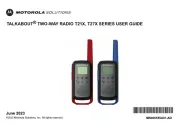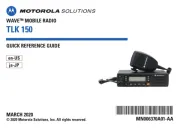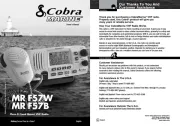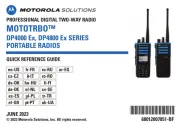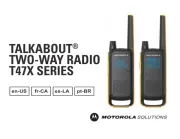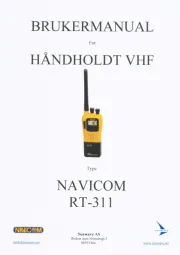
INSTRUCTIONS
1-1-32 Kamiminami, Hirano-ku,
Osaka 547-0003, Japan
• The antennas, batteries, belt clips, speaker-microphone,
and other accessories that are listed in “OPTIONS”
on this sheet, are authorized for use with this product.
Use of accessories other than those specied may
result in RF exposure levels exceeding the FCC and IC
requirements for wireless RF exposure.
• Health Canada Safety Code 6 - Limits of Human
Exposure to Electromagnetic Energy in the Frequency
Range from 3 kHz to 300 GHz.
To ensure that your expose to RF
electromagnetic energy is within the FCC
and IC allowable limits for occupational
use, always adhere to the following
guidelines:
DO NOT operate the radio without a proper antenna
attached, as this may damage the radio and may also
cause you to exceed FCC and IC RF exposure limits. A
proper antenna is the antenna supplied with this radio by
the manufacturer or an antenna specically authorized by
the manufacturer for use with this radio.
DO NOT transmit for more than 50% of the total radio use
time (“50% duty cycle”). Transmitting more than 50% of
the time can cause FCC and IC RF exposure compliance
requirements to be exceeded. The radio is transmitting
when the LED indicator lights red. You can cause the radio
to transmit by pushing the “PTT” switch or VOX function.
ALWAYS KEEP the antenna at least 2.5 cm (1 inch)
away from the body when transmitting, and only use the
Icom belt-clips listed in “OPTIONS” on this sheet when
attaching the radio to your belt, or other place, to ensure
FCC and IC RF exposure compliance requirements are
not exceeded.
The information listed above provides the user with
the information needed to make him or her aware of
RF exposure, and what to do to assure that this radio
operates within the FCC and IC RF exposure limits of this
radio.
Electromagnetic Interference/Compatibility
During transmissions, your Icom radio generates RF
energy that can possibly cause interference with other
devices or systems. To avoid such interference, turn o
the radio in areas where signs are posted to do so. DO
NOT operate the transmitter in areas that are sensitive to
electromagnetic radiation such as hospitals, aircraft, and
blasting sites.
Occupational/Controlled Use
The radio transmitter is used in situations in which persons
are exposed as a consequence of their employment,
provided those persons are fully aware of the potential for
exposure and can exercise control over their exposure.
A7311D-1EX-12
Printed in Japan
© 2012–2025 Icom Inc.
Thank you for choosing this Icom product.
READ ALL INSTRUCTIONS carefully and completely
before using this product.
VHF DIGITAL TRANSCEIVERS
|F3400D series
|F3400DP series
UHF DIGITAL TRANSCEIVERS
|F4400D series
|F4400DP series
IMPORTANT
SAVE THESE INSTRUCTIONS — These instructions
contain important operating instructions for the IC-
F3400DT/IC-F3400DS/IC-F3400D/IC-F3400DPT/IC-
F3400DPS/IC-F3400DP VHF DIGITAL TRANSCEIVERS
and the IC-F4400DT/IC-F4400DS/IC-F4400D/IC-
F4400DPT/IC-F4400DPS/IC-F4400DP UHF DIGITAL
TRANSCEIVERS.
This instruction sheet includes some functions that are
usable only when they are preset by your dealer. Ask your
dealer for details.
PRECAUTIONS
R DANGER! NEVER short terminals of the battery pack.
Shorting may occur if the terminals touch metal object
such as a key, so be careful when placing the battery
packs (or the transceiver) in bags, and so on. Carry them
so that shorting cannot occur with metal objects. Shorting
may damage not only the battery pack, but also the
transceiver.
R DANGER! NEVER operate the transceiver near
unshielded electrical blasting caps or in an explosive
atmosphere.
R DANGER! NEVER use or charge Icom battery packs
with non-Icom transceivers or non-Icom chargers. Only
Icom battery packs are tested and approved for use with
Icom transceivers or charged with Icom chargers. Using
third-party or counterfeit battery packs or chargers may
cause smoke, re, or cause the battery to burst.
R WARNING! NEVER operate the transceiver with a
headset or other audio accessories at high volume levels.
The continuous high volume operation may cause a
ringing in your ears. If you experience the ringing, reduce
the volume level or discontinue use.
R WARNING! NEVER operate the transceiver while
driving a vehicle. Safe driving requires your full attention—
anything less may result in an accident.
CAUTION: DO NOT place or leave the transceiver in
direct sunlight or in places with temperatures below –30°C
(–22°F) or above 60°C (140°F). The basic operations
of the transceiver are guaranteed within the specied
operating temperature range. However, the Liquid Crystal
Display may not operate correctly, or show an indication in
the case of long hours of operation, or after being placed
in extremely cold areas.
CAUTION: DO NOT use harsh solvents such as benzine
or alcohol when cleaning. This could damage the
equipment surfaces. If the surface becomes dusty or dirty,
wipe it clean with a soft, dry cloth.
CAUTION: DO NOT modify the transceiver. The
specications may change and then the transceiver may
not comply with the requirements of required regulations.
The transceiver warranty does not cover any problems
caused by unauthorized modication.
CAUTION: DO NOT carry the transceiver by holding the
antenna.
CAUTION: DO NOT operate unless the exible antenna,
battery pack and jack cover are securely attached to
the transceiver. Conrm that the antenna and battery
pack are dry before attaching. Exposing the inside of the
transceiver to dust or water can cause serious damage to
the transceiver.
NEVER place the transceiver in an insecure place to avoid
inadvertent use by unauthorized persons.
CAUTION: DO NOT operate the transceiver if it becomes
hot after continuously transmitting for long periods of time.
This may damage the transceiver.
BE CAREFUL! The transceiver meets IP68 requirements
for dust-tight and waterproof protection. However, once the
transceiver has been dropped, dust-tight and waterproof
protection cannot be guaranteed due to the fact that
the transceiver may be cracked or the waterproof seal
damaged, and so on.
* Only when the BP-283, BP-284 or BP-303, exible
antenna, and connector cover or the optional speaker
microphone are attached.
RECOMMENDATION
CLEAN THE TRANSCEIVER THOROUGHLY IN A BOWL
OF FRESH WATER after exposure to saltwater, and dry
it before operating. Otherwise, the transceiver’s keys,
switches, and controllers may become unusable, due to
salt crystallization, and/or the charging terminals of the
battery pack may corrode.
NOTE: If the transceiver’s waterproof protection appears
defective, carefully clean it with a soft, damp (fresh water)
cloth, then dry it before operating.
The transceiver may lose its waterproof protection if the
case or connector cover is cracked or broken, or the
transceiver has been dropped.
Contact your Icom distributor or your dealer for advice.
ABOUT CE AND DOC
Hereby, Icom Inc. declares that the
versions of IC-F3400DT, IC-F3400DS,
IC-F3400D, IC-F3400DPT,
IC-F3400DPS, IC-F3400DP, IC-F4400DT,
IC-F4400DS, IC-F4400D, IC-F4400DPT,
IC-F4400DPS, and IC-F4400DP
which have the “CE” symbol on the product, comply
with the essential requirements of the Radio Equipment
Directive, 2014/53/EU, and the restriction of the use of
certain hazardous substances in electrical and electronic
equipment Directive, 2011/65/EU. The full text of the
EU declaration of conformity is available at the following
internet address:
https://www.icomjapan.com/support/
These versions also comply with the essential
requirements of the Battery Regulation, (EU) 2023/1542.
FCC INFORMATION
This equipment has been tested and found to comply with
the limits for a Class A digital device, pursuant to part 15
of the FCC Rules. These limits are designed to provide
reasonable protection against harmful interference when
the equipment is operated in a commercial environment.
This equipment generates, uses, and can radiate
radio frequency energy and, if not installed and used
in accordance with the instruction manual, may cause
harmful interference to radio communications. Operation
of this equipment in a residential area is likely to cause
harmful interference in which case the user will be
required to correct the interference at his own expense.
CAUTION: Changes or modications to this transceiver,
not expressly approved by Icom Inc., could void
your authority to operate this transceiver under FCC
regulations.
D FCC SDoC
This device complies with Part 15 of the FCC Rules.
Operation is subject to the condition that this device does
not cause harmful interference.
Model Name: IC-F3400DT, IC-F3400DS, IC-F3400D,
IC-F4400DT, IC-F4400DS, IC-F4400D
Responsible Party:
Company Name: Icom America Inc.
Address: 12421 Willows Road NE, Kirkland,
WA 98034
U.S. Contact Information:
800-USA-ICOM (800-872-4266)
Monday – Friday 7 AM to 5 PM PST
EXPLICIT DEFINITIONS
WORD DEFINITION
R DANGER!
Personal death, serious injury or an
explosion may occur.
R WARNING!
Personal injury, re hazard or
electric shock may occur.
CAUTION Equipment damage may occur.
NOTE
Recommended for optimum use. No
risk of personal injury, re or electric
shock.
Icom is not responsible for the destruction, damage to,
or performance of any Icom or non-Icom equipment, if
the malfunction is because of:
• Force majeure, including, but not limited to, res,
earthquakes, storms, oods, lightning, other natural
disasters, disturbances, riots, war, or radioactive
contamination.
• The use of Icom transceivers with any equipment that
is not manufactured or approved by Icom.
Even when the transceiver power is OFF, a slight current
still ows in the circuits. Remove the battery pack from the
transceiver when not using it for a long time. Otherwise,
the installed battery pack will become exhausted, and will
need to be recharged or replaced.
MAKE SURE to turn OFF the transceiver power before
connecting the supplied or optional equipment.
Operate the transceiver that complies with your local laws
and regulations.
Depending on countries and/or regions, transceiver’s
output power and/or operations on specic frequencies
may be restricted to avoid interferences with existing radio
stations or services.
Battery caution
Misuse of Li-ion batteries may result in the following
hazards: smoke, re, or the battery may rupture. Misuse
can also cause damage to the battery or degradation of
battery performance.
R DANGER! NEVER solder the battery terminals, or
NEVER modify the battery pack. This may cause heat
generation, and the battery may burst, emit smoke or
catch re.
R DANGER! NEVER place or leave battery packs in areas
with temperatures above 60°C (140°F). High temperature
buildup in the battery, such as could occur near res or
stoves, inside a sun-heated vehicle, or in direct sunlight for
long periods of time may cause the battery cells to rupture
or catch re. Excessive temperatures may also degrade
battery performance or shorten battery cell’s life.
R DANGER! NEVER strike or otherwise impact the battery
pack. Do not use the battery pack if it has been severely
impacted or dropped, or if the battery pack has been
subjected to heavy pressure. Battery damage may not be
visible on the outside of the case. Even if the surface of
the battery does not show cracks or any other damage, the
cells inside the battery may rupture or catch re.
R DANGER! NEVER place or leave battery packs near
re. Fire or heat may cause them to rupture or explode.
Dispose of used battery packs in accordance with local
regulations.
R DANGER! NEVER let uid from inside the battery get
in your eyes. This can cause blindness. Rinse your eyes
with clean water, without rubbing them, and immediately
go to a doctor.
R DANGER! NEVER expose the battery pack to rain,
snow, seawater, or any other liquids. Do not charge or use
a wet battery. If the battery gets wet, be sure to wipe it dry
before using.
R WARNING! NEVER use deteriorated battery packs.
They could cause a re.
R WARNING! NEVER put the battery in a microwave
oven, high-pressure container, or in an induction heating
cooker. This could cause a re, overheating, or cause the
battery cells to rupture.
R WARNING! NEVER use the battery pack if it emits an
abnormal odor, heats up, or is discolored or deformed. If
any of these conditions occur, contact your Icom dealer or
distributor.
R WARNING! NEVER let uid from inside the battery
cells come in contact with you body. If it does, immediately
wash with clean water.
CAUTION: DO NOT use the battery pack out of the
specied temperature range, for the transceiver,
(–30°C ~ +60°C, –22°F ~ +140°F), and the battery pack
itself (–20°C ~ +60°C, –4°F ~ +140°F). Using the battery
out of its specied temperature range will reduce its
performance and battery cell’s life. Please note that the
specied temperature range of the battery may exceed
that of the transceiver. In such cases, the transceiver
may not work properly because it is out of its operating
temperature range.
CAUTION: Shorter battery life could occur if the battery
is left fully charged, completely discharged, or in an
excessive temperature environment (above +50°C
(+122°F)) for an extended period of time. If the battery
pack must be left unused for a long time, it must be
detached from the transceiver after discharging. You may
use the battery pack until the remaining capacity is about
half, then keep it safely in a cool and dry place at the
following temperature range:
–20°C ~ +50°C (–4°F ~ +122°F) (within a month)
–20°C ~ +40°C (–4°F ~ +104°F) (within three months)
–20°C ~ +20°C (–4°F ~ +68°F) (within a year)
BE SURE to replace the battery pack with a new one
approximately ve years after manufacturing, even if it still
holds a charge. The inside battery material will become
weak after a period of time, even with little use. The
estimated number of times you can charge the battery is
between 300 and 500. Even when the battery appears to
be fully charged, the operating time of the transceiver may
become short when:
• Approximately ve years have passed since the battery
was manufactured.
• The battery has been repeatedly charged.
The battery cells may deteriorate and swell due to their
characteristics if used in an environment and conditions
such as: frequently charged, recharged immediately after
full charge, used or saved in a hot place, or charged
by methods other than the instructions. If the battery
pack swells, it has reached the end of its life due to
deterioration. Replace it with a brand new one.
D Charging caution
R DANGER! NEVER charge the battery pack in areas
with extremely high temperatures, such as near res or
stoves, inside a sun-heated vehicle, or in direct sunlight.
In such environments, the safety/protection circuit in the
battery will activate, causing the battery to stop charging.
R WARNING! NEVER charge the transceiver during a
lightning storm. It may result in an electric shock, cause
a re or damage the transceiver. Always disconnect the
power adapter before a storm.
R WARNING! NEVER charge or leave the battery in the
battery charger beyond the specied time for charging. If
the battery is not completely charged by the specied time,
stop charging and remove the battery from the battery
charger. Continuing to charge the battery beyond the
specied time limit may cause a re, overheating, or the
battery may rupture.
R WARNING! NEVER insert the transceiver (battery
attached to the transceiver) into the charger if it is wet or
soiled. This could corrode the battery charger terminals or
damage the charger. The charger is not waterproof.
R WARNING! Occasionally observe the battery pack
condition while charging. If any abnormal condition occurs,
discontinue using the battery pack.
VOICE CODING TECHNOLOGY
The AMBE+2™ voice coding Technology embodied in this
product is protected by intellectual property rights including
patent rights, copyrights and trade secrets of Digital Voice
Systems, Inc. This voice coding Technology is licensed
solely for use within this Communications Equipment.
The user of this Technology is explicitly prohibited from
attempting to extract, remove, decompile, reverse
engineer, or disassemble the Object Code, or in any other
way convert the Object Code into a human-readable form.
U.S. Patent Nos. #8,359,197 and #7,970,606.
ABOUT GPS/GLONASS RECEIVER
An internal GPS or GLONASS receiver may not work if the
transceiver transmits or receives in the frequency ranges
as shown below. This problem is made in the internal
circuit and does not indicate a transceiver malfunction.
For the IC-F3400D and IC-F3400DP series (Unit: MHz)
GPS receiver GLONASS receiver
Transmit
142.850 ~ 142.860 145.275 ~ 145.945
157.135 ~ 157.145 159.805 ~ 160.540
Receive 146.845 ~ 147.110 149.745 ~ 150.790
For the IC-F4400D and IC-F4400DP series (Unit: MHz)
GPS receiver GLONASS receiver
Transmit 392.840 ~ 392.865 399.515 ~ 401.343
Receive 443.545 ~ 444.065 449.335 ~ 451.425
Icom and the Icom logo are registered trademarks of Icom
Incorporated (Japan) in Japan, the United States, the United
Kingdom, Germany, France, Spain, Russia, Australia, New
Zealand, and/or other countries.
The Bluetooth
®
word mark and logos are registered trademarks
owned by Bluetooth SIG, Inc. and any use of such marks by
Icom Inc. is under license. Other trademarks and trade names
are those of their respective owners.
All other products or brands are registered trademarks or
trademarks of their respective holders.
DISPOSAL
The crossed-out wheeled-bin symbol on your
product, literature, or packaging reminds
you that in the European Union, all electrical
and electronic products, batteries, and
accumulators (rechargeable batteries) must
be taken to designated collection locations at
the end of their working life. Do not dispose
of these products as unsorted municipal waste. Dispose of
them according to the laws in your area.
SAFETY TRAINING INFORMATION
Your Icom radio generates RF
electromagnetic energy while transmitting.
This radio is designed for and classied as
for “Occupational Use Only.” This means
it must be used only during the course
of employment by individuals aware of
the hazards, and the ways to minimize
such hazards. This radio is NOT intended
for use by the “General Population” in an uncontrolled
environment. This radio has been tested and complies
with the FCC and IC RF exposure limits for “Occupational
Use Only”. In addition, your Icom radio complies with the
following Standards and Guidelines with regard to RF
energy and electromagnetic energy levels and evaluation
of such levels for exposure to humans:
• FCC KDB Publication 447498 D03, Evaluating
Compliance with FCC Guidelines for Human Exposure to
Radio Frequency Electromagnetic Fields.
• American National Standards Institute (C95.1-2019),
IEEE Standard for Safety Levels with Respect to Human
Exposure to Electric, Magnetic, and Electromagnetic
Fields, 0 Hz to 300 GHz
• American National Standards Institute (C95.3-2021),
IEEE Recommended Practice for Measurements and
Computations of Electric, Magnetic, and Electromagnetic
Fields with Respect to Human Exposure to Such Fields,
0 Hz to 300 GHz
May 2025
CAUTION: DO NOT charge the battery outside of the
specied temperature range:
BC-214 and BC-219 (16˚C ~ 40˚C (60.8˚F ~ 104˚F)).
BC-225, BC-226, and BC-227
(15˚C ~ 40˚C (59˚F ~ 104˚F)).
Otherwise, the charging time will be longer, but the battery
will not reach a full charge. While charging, at a point
after the temperature goes out of the specied range, the
charging will automatically stop.
Icom recommends charging the pack at 25˚C (77˚F). The
pack may heat up or rupture if charged out of the specied
temperature range. Additionally, pack’s performance or
battery cell life may be reduced.
CAUTION: DO NOT use the power adapter unless
the power outlet is easily accessible and near the unit.
Remove it from the AC power outlet when not in use.
ABOUT UKCA DOC
To obtain the UKCA Declaration of Conformity, please
search for your product at https://icomuk.co.uk, or
alternatively call + 44 (0) 1227 741741 or email
info@icomuk.co.uk.
